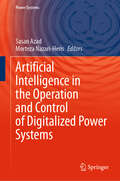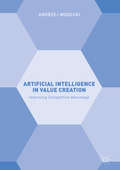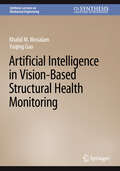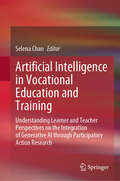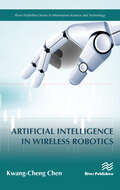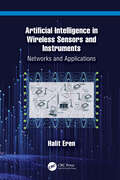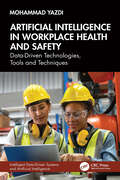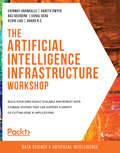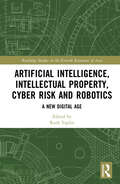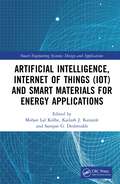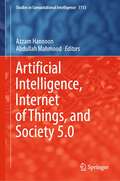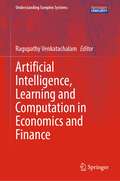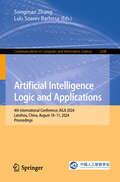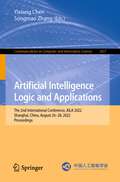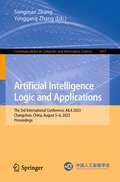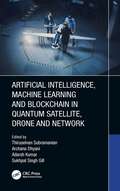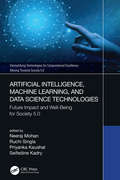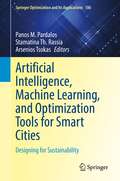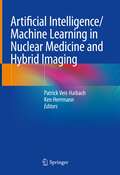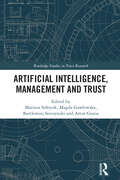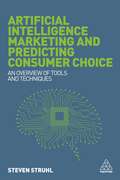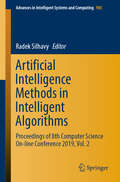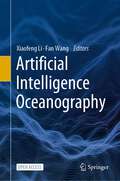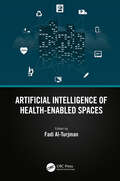- Table View
- List View
Artificial Intelligence in the Operation and Control of Digitalized Power Systems (Power Systems)
by Sasan Azad Morteza Nazari-HerisThis book covers the practical application of AI-based methods in modern power systems. The complexity of current power system operations has dramatically increased due to the higher penetration of renewable energy sources and power electronic components. Therefore, providing efficient techniques is essential for secure and clean power system operation. This book focuses on the data-driven operation of the digitalized power system using machine language (ML). First, the basics of power system operation and control are presented, covering various areas of system control and operation. Next, significant advances in modern power systems and their corresponding challenges are discussed, and artificial intelligence (AI)-powered techniques, specifically machine learning, are introduced to address these issues. The book also explores AI-powered applications in the operation of power systems. These applications include various aspects of the data-driven process in both situational awareness and control areas. They are presented as practical examples indicating the implementation of an ML-based method to solve operational problems. Artificial Intelligence in the Operation and Control of Digitalized Power Systems is a valuable guide for students, researchers, and practicing engineers to AI-based techniques and real-world applications in power systems.
Artificial Intelligence in Value Creation: Improving Competitive Advantage
by Andrzej WodeckiThis book analyses various models of value creation in projects and businesses by applying different forms of Artificial Intelligence in their products and services. First presenting the main concepts and ideas behind AI, Wodecki assesses different models of technology-based value creation based upon the analysis of over 400 case studies. This framework shows how AI may influence both value creation and competitive advantage (efficiency, creativity and flexibility) within a modern organization. Finally, a conceptual model is formulated to evaluate AI-supported in-company projects and new ventures and identify the key managerial and technical competencies required.
Artificial Intelligence in Vision-Based Structural Health Monitoring (Synthesis Lectures on Mechanical Engineering)
by Khalid M. Mosalam Yuqing GaoThis book provides a comprehensive coverage of the state-of-the-art artificial intelligence (AI) technologies in vision-based structural health monitoring (SHM). In this data explosion epoch, AI-aided SHM and rapid damage assessment after natural hazards have become of great interest in civil and structural engineering, where using machine and deep learning in vision-based SHM brings new research direction. As researchers begin to apply these concepts to the structural engineering domain, especially in SHM, several critical scientific questions need to be addressed: (1) What can AI solve for the SHM problems? (2) What are the relevant AI technologies? (3) What is the effectiveness of the AI approaches in vision-based SHM? (4) How to improve the adaptability of the AI approaches for practical projects? (5) How to build a resilient AI-aided disaster prevention system making use of the vision-based SHM? This book introduces and implements the state-of-the-art machine learning and deep learning technologies for vision-based SHM applications. Specifically, corresponding to the above-mentioned scientific questions, it consists of: (1) motivation, background & progress of AI-aided vision-based SHM, (2) fundamentals of machine learning & deep learning approaches, (3) basic AI applications in vision-based SHM, (4) advanced topics & approaches, and (5) resilient AI-aided applications. In the introduction, a brief coverage about the development progress of AI technologies in the vision-based area is presented. It gives the readers the motivations and background of the relevant research. In Part I, basic knowledges of machine and deep learning are introduced, which provide the foundation for the readers irrespective of their background. In Part II, to verify the effectiveness of the AI methods, the key procedure of the typical AI-aided SHM applications (classification, localization, and segmentation) is explored, including vision data collection, data pre-processing,transfer learning-based training mechanism, evaluation, and analysis. In Part III, advanced AI topics, e.g., generative adversarial network, semi-supervised learning, and active learning, are discussed. They aim to address several critical issues in practical projects, e.g., the lack of well-labeled data and imbalanced labels, to improve the adaptability of the AI models. In Part IV, the new concept of “resilient AI” is introduced to establish an intelligent disaster prevention system, multi-modality learning, multi-task learning, and interpretable AI technologies. These advances are aimed towards increasing the robustness and explainability of the AI-enabled SHM system, and ultimately leading to improved resiliency.The scope covered in this book is not only beneficial for education purposes but also is essential for modern industrial applications. The target audience is broad and includes students, engineers, and researchers in civil engineering, statistics, and computer science. Unique Book Features:• Provide a comprehensive review of the rapidly expanding field of vision-based structural health monitoring (SHM) using artificial intelligence approaches. • Re-organize fundamental knowledge specific to the machine and deep learning in vision tasks.• Include comprehensive details about the procedure of conducting AI approaches for vision-based SHM along with examples and exercises.• Cover a vast array of special topics and advanced AI-enabled vision-based SHM applications.• List a few potential extensions for inspiring the readers for future investigation.
Artificial Intelligence in Vocational Education and Training: Understanding Learner and Teacher Perspectives on the Integration of Generative AI through Participatory Action Research
by Selena ChanThis book details a series of studies across several levels of learning and vocational education and training (VET) discipline areas. In the main, the advent of natural language AI chatbots exampled by ChatGPT, has caused the educational sector to take on a defensive stance. Both schools and the higher education sector are engaged in an on-going &‘arms race&’ to prevent learners from using AI to augment assessments. Therefore, there has been a focus on plagiarism prevention, rather than to better understand the potentialities for utilizing AI to support better learning. This book explores the collaborative development and planning between educational developers/learning designers and teachers to design learning activities which could leverage off various artificial intelligence (AI) platforms. In doing, support is provided for effective learning <span style="mso-ascii-font-family: Calibri; mso-hansi-font-family: Calibri; mso-bidi-font-family
Artificial Intelligence in Wireless Robotics (River Publishers Series In Information Science And Technology Ser.)
by Kwang-Cheng ChenRobots, autonomous vehicles, unmanned aerial vehicles, and smart factory, will significantly change human living style in digital society. Artificial Intelligence in Wireless Robotics introduces how wireless communications and networking technology enhances facilitation of artificial intelligence in robotics, which bridges basic multi-disciplinary knowledge among artificial intelligence, wireless communications, computing, and control in robotics. A unique aspect of the book is to introduce applying communication and signal processing techniques to enhance traditional artificial intelligence in robotics and multi-agent systems.The technical contents of this book include fundamental knowledge in robotics, cyber-physical systems, artificial intelligence, statistical decision and Markov decision process, reinforcement learning, state estimation, localization, computer vision and multi-modal data fusion, robot planning, multi-agent systems, networked multi-agent systems, security and robustness of networked robots, and ultra-reliable and low-latency machine-to-machine networking. Examples and exercises are provided for easy and effective comprehension.Engineers wishing to extend knowledge in the robotics, AI, and wireless communications, would be benefited from this book. In the meantime, the book is ready as a textbook for senior undergraduate students or first-year graduate students in electrical engineering, computer engineering, computer science, and general engineering students. The readers of this book shall have basic knowledge in undergraduate probability and linear algebra, and basic programming capability, in order to enjoy deep reading.
Artificial Intelligence in Wireless Sensors and Instruments: Networks and Applications
by Halit ErenThis book heralds a new era in instrumentation and measurements. It combines artificial intelligence (AI) and wireless communications technologies with instrumentation and measurement systems to function as a single unit. AI has advanced considerably due to deep learning utilizing artificial neural networks, availability of large and curated datasets, implementation of a new generation of fast processors having millions of transistors in chips, advanced algorithms, competitive commercial interests, and interests of governments to gain advantages. At the same time, new and highly advanced wireless technologies open new frontiers in communication systems, both technologically and in terms of applications aspects. Advanced technologies such as 5G and 6G networks enable easy use of communication systems by billions of people as well as by billions of machine-to-machine systems.In this book, the communication principles are explained and the implementation of AI on wireless networks is discussed. Many examples are provided. The author discusses instruments and instrumentation networks, modern sensors, and transducers in detail.AI is the technology humans have created where the machines do not only assist us but also think for us creatively in some cases, excelling humans thinking and reasoning. This book includes a chapter explaining how this is done, backed up with more than 50 figures. The security issues, fairness, efficiency, and social impact and acceptance of AI are highlighted. As explained in this book, AI and wireless communications are changing our lives in many ways, including entertainment, games, social interactions, medicine and healthcare, R&D, automated living, intelligent transport systems, finance and economy, and the Internet of Things.
Artificial Intelligence in Workplace Health and Safety: Data-Driven Technologies, Tools and Techniques (Intelligent Data-Driven Systems and Artificial Intelligence)
by Mohammad YazdiIn today's dynamic workplace environment, ensuring the safety and well-being of employees has never been more critical. This book explores cutting-edge technologies intersecting with workplace safety to deliver effective and practical results.Artificial Intelligence in Workplace Health and Safety: Data-Driven Technologies, Tools and Techniques offers a comprehensive roadmap for professionals, researchers, and practitioners in work health and safety (WHS), revolutionizing traditional approaches through the integration of data-driven methodologies and artificial intelligence. Covering the foundations and practical applications of data-driven WHS and historical perspectives to current regulatory frameworks, it investigates the key concepts of data collection, management, and integration. Through real-world case studies and examples, readers can discover how AI technologies such as machine learning, computer vision, and natural language processing are reshaping WHS practices, mitigating risks, and optimizing safety measures. The reader will learn applications of AI and data-driven methodologies in their workplace settings to improve safety. With its practical insights, real-world examples, and progressive approach, this title ensures that readers are not just prepared for the future of WHS but empowered to shape it for better. This text is written for professionals and practitioners seeking to enhance workplace safety through innovative technologies. This extends to safety professionals, HR personnel and engineers across different sectors.
The Artificial Intelligence Infrastructure Workshop: Build your own highly scalable and robust data storage systems that can support a variety of cutting-edge AI applications
by Gareth Dwyer Chinmay Arankalle Bas Geerdink Kunal Gera Kevin Liao Anand N.S.Explore how a data storage system works – from data ingestion to representationKey FeaturesUnderstand how artificial intelligence, machine learning, and deep learning are different from one anotherDiscover the data storage requirements of different AI apps using case studiesExplore popular data solutions such as Hadoop Distributed File System (HDFS) and Amazon Simple Storage Service (S3)Book DescriptionSocial networking sites see an average of 350 million uploads daily - a quantity impossible for humans to scan and analyze. Only AI can do this job at the required speed, and to leverage an AI application at its full potential, you need an efficient and scalable data storage pipeline. The Artificial Intelligence Infrastructure Workshop will teach you how to build and manage one.The Artificial Intelligence Infrastructure Workshop begins taking you through some real-world applications of AI. You'll explore the layers of a data lake and get to grips with security, scalability, and maintainability. With the help of hands-on exercises, you'll learn how to define the requirements for AI applications in your organization. This AI book will show you how to select a database for your system and run common queries on databases such as MySQL, MongoDB, and Cassandra. You'll also design your own AI trading system to get a feel of the pipeline-based architecture. As you learn to implement a deep Q-learning algorithm to play the CartPole game, you'll gain hands-on experience with PyTorch. Finally, you'll explore ways to run machine learning models in production as part of an AI application.By the end of the book, you'll have learned how to build and deploy your own AI software at scale, using various tools, API frameworks, and serialization methods.What you will learnGet to grips with the fundamentals of artificial intelligenceUnderstand the importance of data storage and architecture in AI applicationsBuild data storage and workflow management systems with open source toolsContainerize your AI applications with tools such as DockerDiscover commonly used data storage solutions and best practices for AI on Amazon Web Services (AWS)Use the AWS CLI and AWS SDK to perform common data tasksWho this book is forIf you are looking to develop the data storage skills needed for machine learning and AI and want to learn AI best practices in data engineering, this workshop is for you. Experienced programmers can use this book to advance their career in AI. Familiarity with programming, along with knowledge of exploratory data analysis and reading and writing files using Python will help you to understand the key concepts covered.
Artificial Intelligence, Intellectual Property, Cyber Risk and Robotics: A New Digital Age (Routledge Studies in the Growth Economies of Asia)
by Ruth TaplinArtificial Intelligence (AI) is the most rapidly developing technology in the current Digital Age, but it is also the least defined, understood and adequately explained technological advance. This book brings together a group of leading experts who assess different aspects of AI from different disciplinary perspectives. The book argues that robots are not living systems but the creations of humans who must ultimately be accountable for the actions of the robots that they have invented. Robots do not have ownership entitlement. The book uses Intellectual Property Rights cases, evidence from roboticists, cybersecurity experts, Patent Court judges, technology officers, climate change scientists, economists, physicists and those from the legal profession to demonstrate that while AI can have very beneficial uses for many aspects of human economy and society, robots are not living systems autonomous from human decision making. This book will be useful to those in banking and insurance, cybersecurity, lawyers, judges, technology officers, economists, scientist inventors, computer scientists, large and small companies and postgraduate students.
Artificial Intelligence, Internet of Things (Smart Engineering Systems)
by Lal Kolhe MohanThis reference text offers the reader a comprehensive insight into recent research breakthroughs in blockchain, the Internet of Things (IoT), artificial intelligence and material structure and hybrid technologies in their integrated platform, while also emphasizing their sustainability aspects. The text begins by discussing recent advances in energy materials and energy conversion materials using machine learning, as well as recent advances in optoelectronic materials for solar energy applications. It covers important topics including advancements in electrolyte materials for solid oxide fuel cells, advancements in composite materials for Li-ion batteries, progression of materials for supercapacitor applications, and materials progression for thermochemical storage of low-temperature solar thermal energy systems. This book: Discusses advances in blockchain, the Internet of Things, artificial intelligence, material structure and hybrid technologies Covers intelligent techniques in materials progression for sensor development and energy material characterization using signal processing Examines the integration of phase change materials in construction for thermal energy regulation in new buildings Explores the current happenings in technology in conjunction with basic laws and mathematical models Connecting advances in engineering materials with the use of smart techniques including artificial intelligence, machine learning and Internet of Things (IoT) in a single volume, this text will be especially useful for graduate students, academic researchers and professionals in the fields of electrical engineering, electronics engineering, materials science, mechanical engineering and computer science.
Artificial Intelligence, Internet of Things, and Society 5.0 (Studies in Computational Intelligence #1113)
by Azzam Hannoon Abdullah MahmoodThis book unlike any other previous book provides a platform for scholars and researchers to present the latest insights and findings on the application of artificial intelligence and other sustainable technologies for a human-centric society. It brings together technology with society with special attention given to AI and IoT-related intricacies for a digital economy. It covers a variety of research topics including block ciphers, network marketing for sustainability entrepreneurship and AI, AI and stock trading decisions, digital transformation, knowledge management, chatbot engineering, cybersecurity, and smart metering system. The book is a comprehensive reference work for scholars, academics, policymakers, students, and professionals presenting an overall understanding of AI, its present and future trends, and presents a discourse on important policies and strategies on inclusivity, diversity, bias, accountability, security, metaverse applications of AI, and other technologies such as IoT.
Artificial Intelligence, Learning and Computation in Economics and Finance (Understanding Complex Systems)
by Ragupathy VenkatachalamThis book presents frontier research on the use of computational methods to model complex interactions in economics and finance. Artificial Intelligence, Machine Learning and simulations offer effective means of analyzing and learning from large as well as new types of data. These computational tools have permeated various subfields of economics, finance, and also across different schools of economic thought. Through 16 chapters written by pioneers in economics, finance, computer science, psychology, complexity and statistics/econometrics, the book introduces their original research and presents the findings they have yielded.Theoretical and empirical studies featured in this book draw on a variety of approaches such as agent-based modeling, numerical simulations, computable economics, as well as employing tools from artificial intelligence and machine learning algorithms. The use of computational approaches to perform counterfactual thought experiments are also introduced, which help transcend the limits posed by traditional mathematical and statistical tools.The book also includes discussions on methodology, epistemology, history and issues concerning prediction, validation, and inference, all of which have become pertinent with the increasing use of computational approaches in economic analysis.
Artificial Intelligence Logic and Applications: 4th International Conference, AILA 2024, Lanzhou, China, August 10–11, 2024, Proceedings (Communications in Computer and Information Science #2248)
by Songmao Zhang Luis Soares BarbosaThis book constitutes the proceedings of the 4th International Conference on Artificial Intelligence Logic and Applications, AILA 2024, held in Lanzhou, China, during August 10–11, 2024. The 16 full papers and the 11 short papers included in this volume were carefully reviewed and selected from 45 submissions. The papers cover the following topics: AI logic foundation; AI logic reasoning; AI logic applications.
Artificial Intelligence Logic and Applications: The 2nd International Conference, AILA 2022, Shanghai, China, August 26–28, 2022, Proceedings (Communications in Computer and Information Science #1657)
by Songmao Zhang Yixiang ChenThis book constitutes refereed proceedings of the 2nd International Conference on Artificial Intelligence Logic and Applications 2022 held in Shanghai, China from August 26–28, 2022.The 20 full papers presented in this volume were carefully reviewed and selected from a total of 27 submissions. The papers in the volume are organised according to the following topical headings: program logic; fuzzy logic; applications; author index.
Artificial Intelligence Logic and Applications: The 3rd International Conference, AILA 2023, Changchun, China, August 5–6, 2023, Proceedings (Communications in Computer and Information Science #1917)
by Songmao Zhang Yonggang ZhangThis book constitutes the proceedings of the Third International Conference, AILA 2023, held in Changchun, China, during August 5–6, 2023. The 26 full papers and the 10 short papers included in this volume were carefully reviewed and selected from 56 submissions. This volume aims to provide novel ideas, original research achievements, and practical experiences in a broad range of artificial intelligence logic and applications.
Artificial Intelligence, Machine Learning and Blockchain in Quantum Satellite, Drone and Network
by Thiruselvan Subramanian Archana Dhyani Adarsh Kumar Sukhpal Singh GillQuantum computing is a field in which advanced technologies like quantum communication, artificial intelligence and machine learning can be used to secure and speed up connectivity using quantum computers, quantum drones or quantum satellites. This book serve as a foundation for researchers and scientists in this field. Future technologies, such as quantum drone delivery systems, quicker internet and climate change mitigation, will need quantum information processing and quantum computation. This book deeply explores the importance of quantum computing in real-time applications. It may be used as a reference book for students in higher education, including undergraduate and graduate students, as well as researchers. Key features: Provides a clear insight into the Internet of Drones for academicians, postdoc fellows, research scholars, graduate and postgraduate students, industry fellows and software engineers Useful to professionals who seek information about the Internet of Drones, including experts in quantum computing and physics and post-quantum cryptography, as well as data scientists and data analysts Covers quantum computing and security for Unmanned Aerial Vehicles (UAV) or drones which are widely useful for applications such as military, government, and non-government systems Explores futuristic aspects of the Intenet of Drones to improve everyday living for ordinary people
Artificial Intelligence, Machine Learning, and Data Science Technologies: Future Impact and Well-Being for Society 5.0 (Demystifying Technologies for Computational Excellence)
by Neeraj MohanThis book provides a comprehensive, conceptual, and detailed overview of the wide range of applications of Artificial Intelligence, Machine Learning, and Data Science and how these technologies have an impact on various domains such as healthcare, business, industry, security, and how all countries around the world are feeling this impact. The book aims at low-cost solutions which could be implemented even in developing countries. It highlights the significant impact these technologies have on various industries and on us as humans. It provides a virtual picture of forthcoming better human life shadowed by the new technologies and their applications and discusses the impact Data Science has on business applications. The book will also include an overview of the different AI applications and their correlation between each other. The audience is graduate and postgraduate students, researchers, academicians, institutions, and professionals who are interested in exploring key technologies like Artificial Intelligence, Machine Learning, and Data Science.
Artificial Intelligence, Machine Learning, and Optimization Tools for Smart Cities: Designing for Sustainability (Springer Optimization and Its Applications #186)
by Panos M. Pardalos Stamatina Th. Rassia Arsenios TsokasThis volume offers a wealth of interdisciplinary approaches to artificial intelligence, machine learning and optimization tools, which contribute to the optimization of urban features towards forming smart, sustainable, and livable future cities.Special features include:New research on the design of city elements and smart systems with respect to new technologies and scientific thinkingDiscussions on the theoretical background that lead to smart cities for the futureNew technologies and principles of research that can promote ideas of artificial intelligence and machine learning in optimized urban environmentsThe book engages students and researchers in the subjects of artificial intelligence, machine learning, and optimization tools in smart sustainable cities as eminent international experts contribute their research results and thinking in its chapters. Overall, its audience can benefit from a variety of disciplines including, architecture, engineering, physics, mathematics, computer science, and related fields.
Artificial Intelligence/Machine Learning in Nuclear Medicine and Hybrid Imaging
by Patrick Veit-Haibach Ken HerrmannThis book includes detailed explanations of the underlying technologies and concepts used in Artificial Intelligence (AI) and Machine Learning (ML) in the context of nuclear medicine and hybrid imaging. A diverse team of authors, including pioneers in the field and respected experts from leading international institutions, share their insights, opinions and outlooks on this exciting topic.A wide range of clinical applications are discussed, from brain applications to body indications, as well as the applicability of AI and ML for cardio-vascular conditions. The book also considers the potential impact of theranostics. To balance the technology-heavy and disease-specific applications, it also discusses ethical / legal issues, economic realities and the human factor, the physician. Though this discussion is not based on research and outcomes, it provides important insights into the ramifications of how AI and ML could transform Nuclear Medicine and Hybrid Imaging practice.As the first work highlighting the role of these concepts specifically in this field, rather than for medical imaging in general, this book offers a valuable resource for Nuclear Medicine Physicians, Radiologists, Physicists, Medical Imaging Administrators and Nuclear Medicine Technologists alike.
Artificial Intelligence, Management and Trust (Routledge Studies in Trust Research)
by Mariusz Sołtysik Magda Gawłowska Bartlomiej Sniezynski Artur GuniaThe main challenge related to the development of artificial intelligence (AI) is to establish harmonious human-AI relations, necessary for the proper use of its potential. AI will eventually transform many businesses and industries; its pace of development is influenced by the lack of trust on the part of society. AI autonomous decision-making is still in its infancy, but use cases are evolving at an ever-faster pace. Over time, AI will be responsible for making more decisions, and those decisions will be of greater importance. The monograph aims to comprehensively describe AI technology in three aspects: organizational, psychological, and technological in the context of the increasingly bold use of this technology in management. Recognizing the differences between trust in people and AI agents and identifying the key psychological factors that determine the development of trust in AI is crucial for the development of modern Industry 4.0 organizations. So far, little is known about trust in human-AI relationships and almost nothing about the psychological mechanisms involved. The monograph will contribute to a better understanding of how trust is built between people and AI agents, what makes AI agents trustworthy, and how their morality is assessed. It will therefore be of interest to researchers, academics, practitioners, and advanced students with an interest in trust research, management of technology and innovation, and organizational management.
Artificial Intelligence Marketing and Predicting Consumer Choice: An Overview of Tools and Techniques
by Dr Steven StruhlThe ability to predict consumer choice is a fundamental aspect to success for any business. In the context of artificial intelligence marketing, there are a wide array of predictive analytic techniques available to achieve this purpose, each with its own unique advantages and disadvantages. Artificial Intelligence Marketing and Predicting Consumer Choice serves to integrate these widely disparate approaches, and show the strengths, weaknesses, and best applications of each. It provides a bridge between the person who must apply or learn these problem-solving methods and the community of experts who do the actual analysis. It is also a practical and accessible guide to the many remarkable advances that have been recently made in this fascinating field.
Artificial Intelligence Methods in Intelligent Algorithms: Proceedings of 8th Computer Science On-line Conference 2019, Vol. 2 (Advances in Intelligent Systems and Computing #985)
by Radek SilhavyThis book discusses the current trends in and applications of artificial intelligence research in intelligent systems. Including the proceedings of the Artificial Intelligence Methods in Intelligent Algorithms Section of the 8th Computer Science On-line Conference 2019 (CSOC 2019), held in April 2019, it features papers on neural networks algorithms, optimisation algorithms and real-world issues related to the application of artificial methods.
Artificial Intelligence Models for the Dark Universe: Forays in Mathematical Cosmology
by Ariel FernándezThe dark universe contains matter and energy unidentifiable with current physical models, accounting for 95% of all the matter and energetic equivalent in the universe. The enormous surplus brings up daunting enigmas, such as the cosmological constant problem and the apparent distortions in the dynamics of deep space, and so coming to grips with the invisible universe has become a scientific imperative.This book addresses this need, reckoning that no cogent physical model of the dark universe can be implemented without first addressing the metaphysical hurdles along the way. The foremost problem is identifying the topology of the universe which, as argued in the book, is highly relevant to unveil the secrets of the dark universe.Artificial Intelligence (AI) is a valuable tool in this effort since it can reconcile conflicting data from deep space with the extant laws of physics by building models to decipher the dark universe. This book explores the applications of AI and how it can be used to embark on a metaphysical quest to identify the topology of the universe as a prerequisite to implement a physical model of the dark sector that enables a meaningful extrapolation into the visibile sector.The book is intended for a broad readership, but a background in college-level physics and computer science is essential. The book will be a valuable guide for graduate students as well as researchers in physics, astrophysics, and computer science focusing on AI applications to elucidate the nature of the dark universe.Key Features:· Provides readers with an intellectual toolbox to understand physical arguments on dark matter and energy.· Up to date with the latest cutting-edge research.· Authored by an expert on artificial intelligence and mathematical physics.
Artificial Intelligence Oceanography
by Xiaofeng Li Fan WangThis open access book invites readers to learn how to develop artificial intelligence (AI)-based algorithms to perform their research in oceanography. Various examples are exhibited to guide details of how to feed the big ocean data into the AI models to analyze and achieve optimized results. The number of scholars engaged in AI oceanography research will increase exponentially in the next decade. Therefore, this book will serve as a benchmark providing insights for scholars and graduate students interested in oceanography, computer science, and remote sensing.
Artificial Intelligence of Health-Enabled Spaces
by Fadi Al-TurjmanArtificial Intelligence of Health-Enabled Spaces (AIoH) has made a number of revolutionary advances in clinical studies that we are aware of. Among these advances, intelligent and medical services are gaining a great deal of interest. Nowadays, AI-powered technologies are not only used in saving lives, but also in our daily life activities in diagnosing, controlling, and even tracking of COVID-19 patients. These AI-powered solutions are expected to communicate with cellular networks smoothly in the next-generation networks (5G/6G and beyond) for more effective/critical medical applications. This will open the door for other interesting research areas. This book focuses on the development and analysis of artificial intelligence (AI) model applications across multiple disciplines. AI-based deep learning models, fuzzy and hybrid intelligent systems, and intrinsic explainable models are also presented in this book. Some of the fields considered in this smart health-oriented book include AI applications in electrical engineering, biomedical engineering, environmental engineering, computer engineering, education, cyber security, chemistry, pharmacy, molecular biology, and tourism. This book is dedicated to addressing the major challenges in fighting diseases and psychological issues using AI. These challenges vary from cost and complexity to availability and accuracy. The aim of this book is hence to focus on both the design and implementation aspects of AI-based approaches in the proposed health-related solutions. Targeted readers are from varying disciplines who are interested in implementing the smart planet/environments vision via intelligent enabling technologies.
